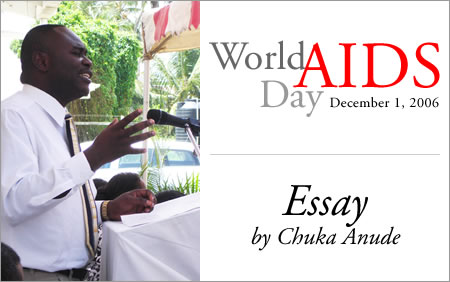Commentary:

By Chuka Anude
Even with his plucky look, you could still see that Mumbi was in great pain. Although he was six years old, he looked like he was four. He was wasting away and was coughing persistently. He once told me he wanted to be a doctor like me when he grew up. As an AIDS orphan, Mumbi and his other two siblings were being cared for by their old, sickly, one-eyed grandmother. They had been driven out of their parents’ home; stigma and discrimination followed them since people believed their parents had died of AIDS. Malnourished and neglected by family members, the children received no social or welfare support from the government. When a chest x-ray suggested cavitary tuberculosis (which is very rare in children), I suspected HIV infection. Tests proved that Mumbi and his siblings were HIV positive. I had to step in. I provided some money, food, clothing and support. We could treat the tuberculosis, but not the HIV. This was 1999 in South Africa.
This encounter became a turning point in my life, giving me the passion to devote my career to mitigating the impact of HIV in Africa and the Caribbean, and to be the voice of the voiceless and hopeless. Even though Mumbi and his two siblings are dead now because the right drugs could not get to them at the right time, there are millions of Mumbis out there who are waiting for our help. Seven years later, this scenario still repeats itself every day in many countries.
HIV is no longer the big news it used to be. People are tired of the horrifying global statistics: 40 million HIV-infected persons; 4.5 million new infections; 3 million deaths, all in 2006 alone. Africa has 10 percent of the world’s population, but about 65 percent of all the HIV cases, 90 percent of all the pediatric HIV cases and 72 percent of all AIDS deaths. About seven African countries have adult HIV prevalence of more than 20 percent, and Swaziland and Botswana are competing for the worst HIV prevalence rates, almost reaching 34 percent in the adult population. The “feminization” of the HIV epidemic is worse in Africa than elsewhere with women making up about 60 percent of HIV-infected persons (in the U.S., women are about 30 percent of the HIV-infected population).
No single disease has exposed the impact of health on development and revealed disparities and inequities in health care access like HIV. It is not just a medical problem but a development crisis with destruction of social capital, reduction in life expectancy and productivity, weakening of health institutions, deterioration of key social and economic indicators and a looming and unavoidable orphan crisis. Lingering poverty, ignorance, illiteracy, cultural norms, women’s disempowerment, and unrestricted and massive brain drain compound the HIV/AIDS problem in Africa.
Where do we go from here? The solutions are not easy. A comprehensive, integrated, multi-disciplinary, multi-sectoral public health approach backed by robust, evidence-based strategies in HIV prevention, care, treatment and support combined with compassionate and bold leadership will help turn the tide. Festus Mogae, president of Botswana, is a good example of a leader who has tackled HIV headlong and helped fight stigma and discrimination. Strategies must at a minimum include universal access to voluntary counseling and testing, prevention (especially of mother to child transmission), care, treatment and support, orphan care, empowerment of women (including preventing unsafe intergenerational and transactional sex), health systems strengthening, nutritional support, stigma and discrimination reduction, microbicide development and use, and debt reduction and poverty alleviation initiatives.
There are rays of hope on the horizon. Even though HIV/AIDS is the greatest public health threat of the 21st century, Africans and the world are responding positively in many ways. Every great crisis will always present a great opportunity. This generation can only be saved by this generation. We must do whatever we can, however we can, to seize the greatest opportunity to stop the HIV’s devastating toll in Africa.
HIV in Africa must remain high on the agenda of public health priorities. Funding must be increased and sustained. Skilled workers mobilized. Universal access to lifesaving prevention and treatment interventions guaranteed. Orphan care expanded. Stigma and discrimination addressed head on.
Working together, we can help children like Mumbi avoid becoming infected with HIV or, if they already are infected, we can help them receive the lifesaving treatment they need—just like children in other parts of the world.
A Hopkins Sommer Scholar at the Bloomberg School, Chuka Anude is a physician and has worked for nine years in HIV/AIDS research, clinical care and program development in four countries in Africa and the Caribbean. His e-mail address is canude@jhsph.edu.